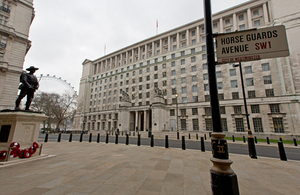
A £115m contract will create a ‘flying electronics laboratory’ to develop our future combat air technology, it has been announced at the Royal International Air Tattoo (RIAT).
- £115 million contract, supporting 300 UK jobs, awarded to develop flying electronics laboratory for future combat air technology.
- Net Zero Strategy signing commits Ministry of Defence to decarbonise its aviation capabilities.
- Extensive Ministerial engagement at key 2023 airshow.
A £115m contract will create a ‘flying electronics laboratory’ to develop our future combat air technology, it has been announced at the Royal International Air Tattoo (RIAT).
The contract – awarded to Leonardo and which will be delivered in partnership with 2Excel – will launch the next stage of the Excalibur Flight Test Aircraft (FTA) project. This will see a Boeing 757 completely overhauled and turned into a flight test aircraft that will resemble a ‘flying electronics laboratory’. The aircraft will test some of the innovative technology that could be deployed on the fighter jet being developed by the Global Combat Air Programme (GCAP).
The Excalibur project is a key element of the UK’s Future Combat Air System (FCAS) that could include the crewed fighter and a broader range of capabilities such as uncrewed aircraft, information systems and weapon systems.
The Excalibur aircraft will be adapted to host integrated sensors, digital technology and integrated communications. This aircraft is expected to fly with the new technology within the next three years, when on-board scientists and engineers will test the sensors and communications systems whilst in flight.
Supporting the Government’s priority to grow the UK economy, the Excalibur programme is sustaining around 300 highly skilled jobs across the UK.
The aircraft is designed in Yorkshire and built in Hampshire with the concepts conceived by Leonardo in Bedfordshire and 2Excel in Northamptonshire. The Excalibur project is part of the UK’s drive to grow our air industrial capability, securing the nation’s future at the cutting edge of combat air design and development.
Richard Berthon, MOD Director Future Combat Air, said:
This contract is a major milestone for the FTA project and demonstrates our commitment in support of the UK Future Combat Air System. I’m excited that this work will enable us to test, in a live flying environment, some of the highly advanced technology that could feature on the aircraft being developed by GCAP.
The GCAP international collaboration between the UK, Italy and Japan continues to progress at pace, with partners working together to develop a new combat aircraft for 2035.
Also at RIAT, Defence Procurement Minister, James Cartlidge signed the Defence Aviation Net Zero Charter.
The Charter signatories have closely collaborated with the MOD on the strategy development and the Charter shows their continued commitment to assist the MOD in its contribution to the Government’s Net Zero by 2050 goal. As signatories they agree to share best practice and help remove barriers, including increasing sustainable aviation fuel usage, improving operational efficiency, utilising zero emissions propulsion technology, and finding innovative ways to deliver aviation operations whilst reducing their climate impact.
The signing of this charter follows the release of the Defence Aviation Net Zero Strategy and shows the commitment of our strategic industry and academic partners to assist the MOD in its contribution to the Government’s Net Zero by 2050 goal.
With aviation activity accounting for over 30% of Defence’s carbon emissions, the Defence Aviation Net Zero Strategy outlines the steps necessary to meet the commitment to decarbonise Defence’s aviation capability, whilst also mitigating potential risks to operational effectiveness that are likely to arise because of climate change.
Minister for Defence Procurement, James Cartlidge said:
RIAT has been an excellent opportunity to meet with industry leaders and range of companies that support UK Defence in keeping the country safe.
The £115 million contract to develop the Excalibur Flight Test Aircraft proves that Britain continues to be a major player in the aviation industry and it’s an important further step in delivering our future fighter jet.
It is also critical that the aviation sector plays its part in delivering the UK’s net zero commitment and the Government is already supporting a variety of technology, fuel, and market-based measures to address aviation emissions.
Climate initiatives already underway include the RAF working with industry leaders Zero Petroleum Ltd to research and develop synthetic fuel technology, which has the potential to eventually eliminate reliance on fossil fuels. In November 2022 the RAF and industry partners flew a Voyager (A330) using 100% sustainable fuel, a world first for a military aircraft of its size, and the first of any aircraft type in the UK.
Building on the release of the Defence Aviation Net Zero Strategy and as part of the RAF Net Zero by 2040 aspirations, the RAF has entered into a strategy partnership with the University of Cambridge’s Aviation Impact Accelerator (AIA).
The AIA partnership will allow the RAF to exploit the insights and analysis of a world leading research group to further its understanding on aviation decarbonisation, how the transition across the civil aviation sector will impact its operational output and how the service can responsibly move towards its own net zero goals.
